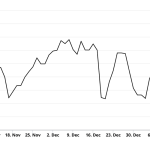
Penny stocks are stocks that have fallen below the $5 per share level, and are often companies that have seen significant selling pressure form. Many such companies are beaten down by the market, heavily shorted, at higher risk of bankruptcy and are investments that are inherently much more risky than the average stock.
However, alongside this higher risk comes higher potential returns. Investors willing to put capital to work in such names can generate outsized returns relative to the market. Of course, investing in a basket of such stocks and having proper position sizing and risk management protocols in place is important.
But for investors looking to move out of the risk curve, here are three stocks I’m monitoring right now.
Lithium Americas (LAC)

Over the past month, Lithium Americas (NYSE:LAC) shares declined by more than 35%, a steeper drop compared to the basic materials sector’s 6.9% loss and the S&P 500’s 3.3% gain. This move was partly driven by the company’s first quarter results, detailing progress at the company’s Thacker Pass lithium mining site. Major construction is expected to begin in the second half of this year. The company is advancing its engineering and procurement, targeting full notice to proceed by late 2024, with a $2.26 billion federal loan secured.
Of course, this project will require significant capital to move forward. And given where lithium prices are, there are specific risks with this stock that investors should be aware of. With $147 million of cash on its balance sheet, Lithium Americas does have some runway to move forward. But many in the market are spooked by the company’s recent public offering of 55 million shares of common stock. While this generated $275 million in liquidity, it also diluted investors.
That said, this stock can fly if Lithium Americas can find the right partners and move forward with its long-term plan (and lithium prices improve). A lot has to go right for that to happen. But that’s what these long-shot bets are all about, aren’t they?
Sirius XM Holdings (SIRI)

Although this company saw significant decline so far in 2024, Sirius XM (NASDAQ:SIRI) still offers a compelling value case. Compared to the past year, shares are now affordable and are offered at half price. Although its business shrunk compared to earlier periods, Sirius XM trades at a price-to-earnings ratio of 8x, with steady cash flow and robust operating profits over recent years, supporting ongoing shareholder returns through buybacks and dividends.
Sirius XM’s key strength lies in its exclusive content deals, including with major sports leagues like the NFL and NBA. These agreements attract and retain subscribers, contributing to steady revenue growth averaging 9% annually over the past decade.
Despite its recent stock performance, Sirius XM remains relevant with 33 million subscribers, defying skeptics who predicted the demise of paid radio services. While revenue growth has been modest, recent quarters have shown improvement. Looking ahead, a Deloitte study indicates a surge in summer road trips, benefiting Sirius XM, which is predominantly car-focused.
Pioneer Power Solutions (PPSI)

Currently, Pioneer Power Solutions (NASDAQ:PPSI) is trading at nearly $4 per share with a very volatile history. Despite this, Pioneer holds a strong position in power solutions. Its offerings, like transformers and switchgear, serve diverse industries, leveraging the growing demand for reliable power solutions amid renewable energy adoption. The company ended 2023 with flying colors, with revenues of $40.8 million and strong 30% revenue growth in 2024. Moreover, its balance sheet boasts $6.1 million in cash.
The company also noted in its Q3 2023 report that revenue doubled to $12.4 million, driven by strong electrical product demand. The market expects earnings to increase 21 cents in 2024 and reach $3 per share by 2033. Revenue is also set to reach a range of $53 million to $220 million. PPSI stock trades at just 7x estimated 2025 earnings, positioning it attractively amidst growing EV and AI trends.
On Penny Stocks and Low-Volume Stocks: With only the rarest exceptions, InvestorPlace does not publish commentary about companies that have a market cap of less than $100 million or trade less than 100,000 shares each day. That’s because these “penny stocks” are frequently the playground for scam artists and market manipulators. If we ever do publish commentary on a low-volume stock that may be affected by our commentary, we demand that InvestorPlace.com’s writers disclose this fact and warn readers of the risks.
Read More: Penny Stocks — How to Profit Without Getting Scammed
On the date of publication, Chris MacDonald did not hold (either directly or indirectly) any positions in the securities mentioned in this article. The opinions expressed in this article are those of the writer, subject to the InvestorPlace.com Publishing Guidelines.





